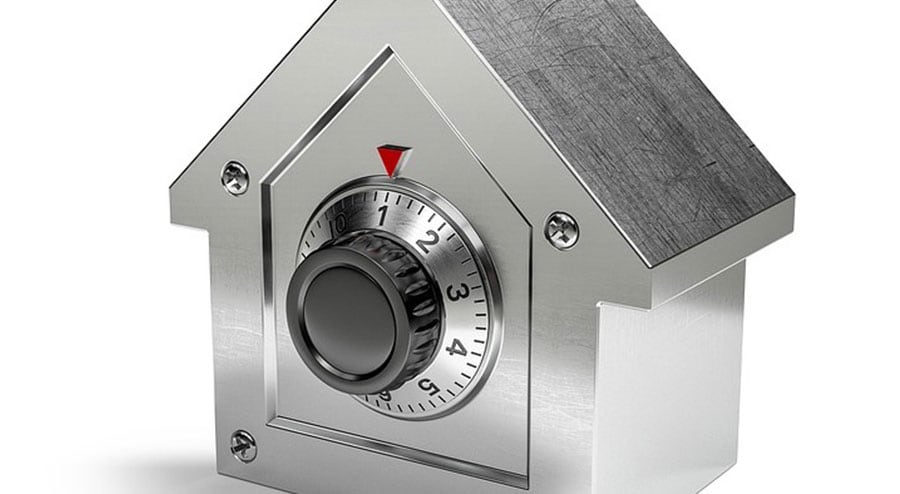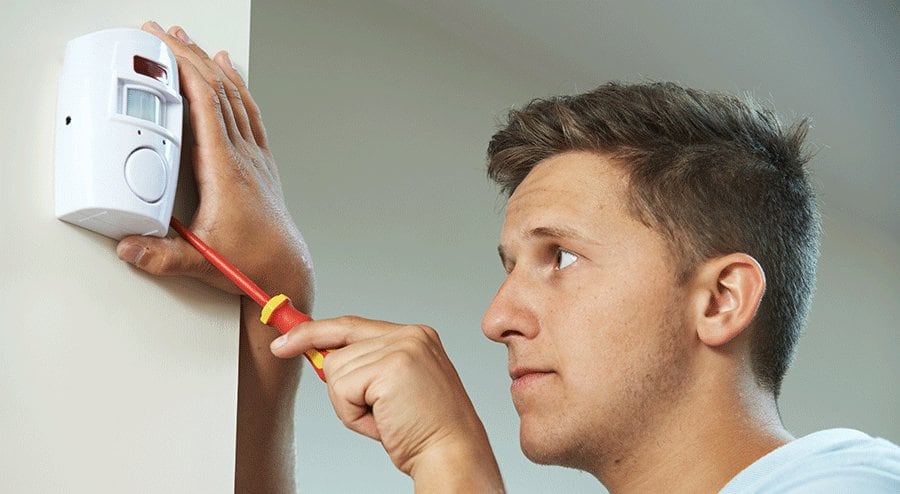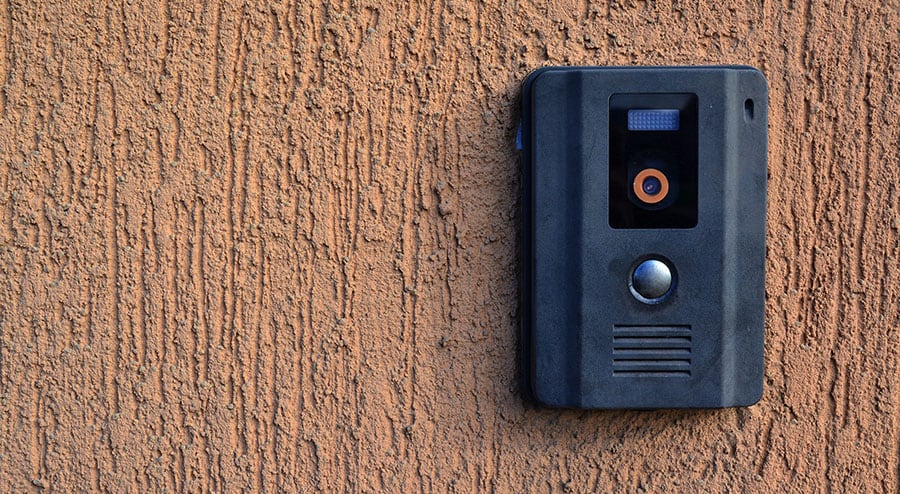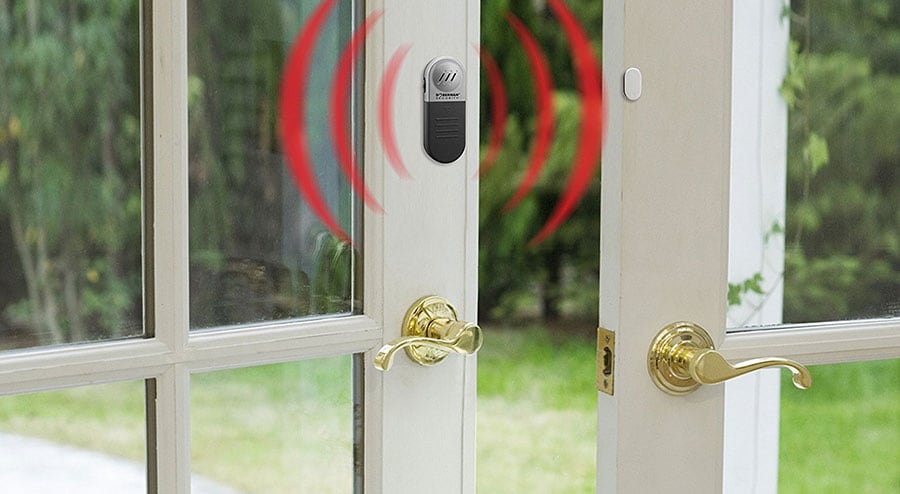Security, such as alarm systems with security cameras and sophisticated control panels, offers peace of mind when it comes to theft and other hazards. Whether you’re a homeowner or just leasing, it makes sense to look into your home security options.
Unfortunately, security alarm systems, which include motion sensors backed by a dedicated security company, require monthly payments that might not fit into your budget. If that’s the case, do-it-yourself security systems can offer many of the same benefits without the monthly fees. However, before you go out and buy one, you should know the ins and outs of DIY home security.
The Pros and Cons of DIY Home Security

As with pretty much anything, there are advantages and disadvantages with a DIY home security system. It’s important to know both sides of the story before you make your final decision.
Pros
Saving Money on Install
By doing the installation yourself, you won’t need to pay someone else to do it. That can save you a significant amount of money. Many DIY systems focus on making the installation straightforward so that you don’t have to be an especially handy person.
The ease of installation also depends on the security system you choose. Wireless systems don’t typically require any special mounting hardware and most just need a power outlet and somewhere for the base to sit. Hard-wired systems may be a little more difficult.
No Monthly Payments or Contracts
If you’re trying to keep your monthly bills at a minimum, DIY home security may be the best choice for you. These systems don’t require any long-term contracts and you won’t be charged a monthly fee.
A System Built Around You
DIY security systems allow you to set-up your system exactly how you want it. While it’s true that you could tell a professional installer how to do things, you would probably have to follow that installer around your house during the whole process.
The systems also offer you the ability to purchase as few—or as many—security products as you need. Most of them start with a hub where you can add different components.
For example, you could buy one window sensor, one motion detector and a remote. Or you could add many window/door sensors, multiple motion sensors, lights, cameras, smart switches and other components. The decision is yours.
No Need for an Appointment
To get a professional installation, you’ll have to set up an appointment. Most installers will only schedule these appointments during normal business hours during the week, which means you will have to leave work.
They may also give you a multiple-hour window for arrival. With DIY installation, there’s no need to move your schedule around. You can just set up your security system whenever you have time.
No Strangers in Your House
If you’re like most people, you will feel obligated to clean up around the house to make it presentable for a stranger. Having a professional installer in your house might mean that you will have to spend a few hours cleaning up.
If you do the installation yourself, there will be no one to impress but yourself. It can also be a little uncomfortable having a stranger walk all around your home. If the idea of an installer traipsing around stresses you out, you should probably look into a do it yourself system.
Might Be Better for Renters
Because most DIY home security systems don’t require much, if any, modification to the home, they can be a good option for tenants. You won’t even need to drill holes in your walls with most of these systems, and you can easily take your system with you when you move.
Cons
Lack of Professional Guidance
After you get your DIY security system up and running, you will still need to learn how to use it on your own. A professional installer will do a walk-through of all the features and important processes so that you can be comfortable with using the system.
If you’re a technology guru, you probably won’t have any trouble whatsoever but, if you would feel better with some professional help, you need to consider the professional installation option.
The Work is On You

When you install a security system on your own, you need to be prepared to read the entire manual and spend some significant time on the phone with a customer service representative. If the security system you choose is complicated, all of this work can easily overwhelm you.
You should also plan on hanging equipment, connecting network cables, and work out any other issues without much help. If you make a mistake, you may spend a lot of time back-tracking to find the problem.
More Expensive Equipment
At the end of the day, companies that sell home security systems make more money when customers choose professional installation.
In many cases, these companies will make up for the lost profit by increasing the price of equipment or disqualifying the equipment from warranties. Basically, if you pay for professional install, you will probably save some money on the equipment.
Missing the Benefits of Professional Monitoring
Most do-it-yourself security systems don’t offer professional monitoring. While that does mean that you avoid monthly service fees, it also means that you miss out on the benefits of monitoring.
Basically, you will be responsible for doing all the monitoring yourself. You won’t have anyone else keeping an eye on things for you or alerting the authorities if something occurs.
Choosing the Right Home Security System for You
If you think a DIY home security is the best fit for you, then your next step involves choosing the best system for your needs. The sheer range of options can be dizzying once you start shopping around so it helps to have a list of important features to focus on.
The Main Hub
Home security systems almost always come with some type of the main hub—or base—that connects to the other parts of the system. This hub serves as the foundation for the entire system and it ensures that everything works together effectively.
The good ones are user-friendly and offer internet access so that you can check on your system from almost anywhere.
An App for Your Smartphone
Some home security systems come with an app that allows you to monitor your home from anywhere you have cell phone coverage.
These systems are typically more expensive and they may come with a monthly fee for cellular network access.However, they can be very handy if you travel a lot or just spend a lot of time away from home.
Window and Door Sensors

The windows and doors of your home are almost always the most susceptible areas to burglaries. They are literally openings in your house, so they should be the first places to focus on when trying to add protection.
Most home security systems include a few window/door sensors; however, you may want to buy extras to cover all of your windows and doors, especially the ones on the first floor.
Motion Sensors
Motion-sensing technology provided a big boost to home security systems when it was first developed. Since then, the price of these motion sensors has dropped significantly.
Most Americans can now afford to add these helpful tools to their home security systems. Whether you set them to trigger a loud alarm, turn on a bright light, or notify the authorities directly, you’ll be glad you added them to your system.
Cameras
While they may be a little more expensive, cameras allow you to actually see what is going on inside your home, and that can pay big dividends. If your home is actually burglarized, high-quality cameras can also help you and the police find the burglar and, in turn, find your stuff!
Alarms
People have been using alarms to protect their homes for over a century, and there’s a reason that they are still around: they work! There is nothing that scares a thief off faster than an ear-piercing siren.
The sound not only makes it extremely uncomfortable to remain in the area, but thieves also know that there is probably help on the way. At the very least, they are much more likely to be seen.
Almost every home security system includes an alarm. They are very affordable so you can add one to your garage and work shed as well.
PRO TIP: No matter which home security system you choose, make sure that you read all of the fine print before signing. Some companies will try to make things look cheaper on the surface than they really are, especially over the entire length of any contract!
DIY home security provides great value for homeowners and renters who want to add protection without spending a ton of money. It’s just important to know that a professional install can also provide an array of great benefits.
When it comes down to it, the better you understand all the different features and options, the more likely you will be happy with your final decision. Everyone has different needs, so home security is all about finding the right system for you.
Sources
- https://staysafe.org/the-ins-and-outs-of-do-it-yourself-home-security/
- https://www.safewise.com/resources/security-system-installation
- https://alarm.riscogroup.com/en…/diy-vs-professional-home-security-whats-difference
- https://books.google.com/books?isbn=1329981979
- https://www.landmarkhw.com/resources/home-warranty…a-home-security…/263
- https://books.google.com/books?isbn=1629141038




